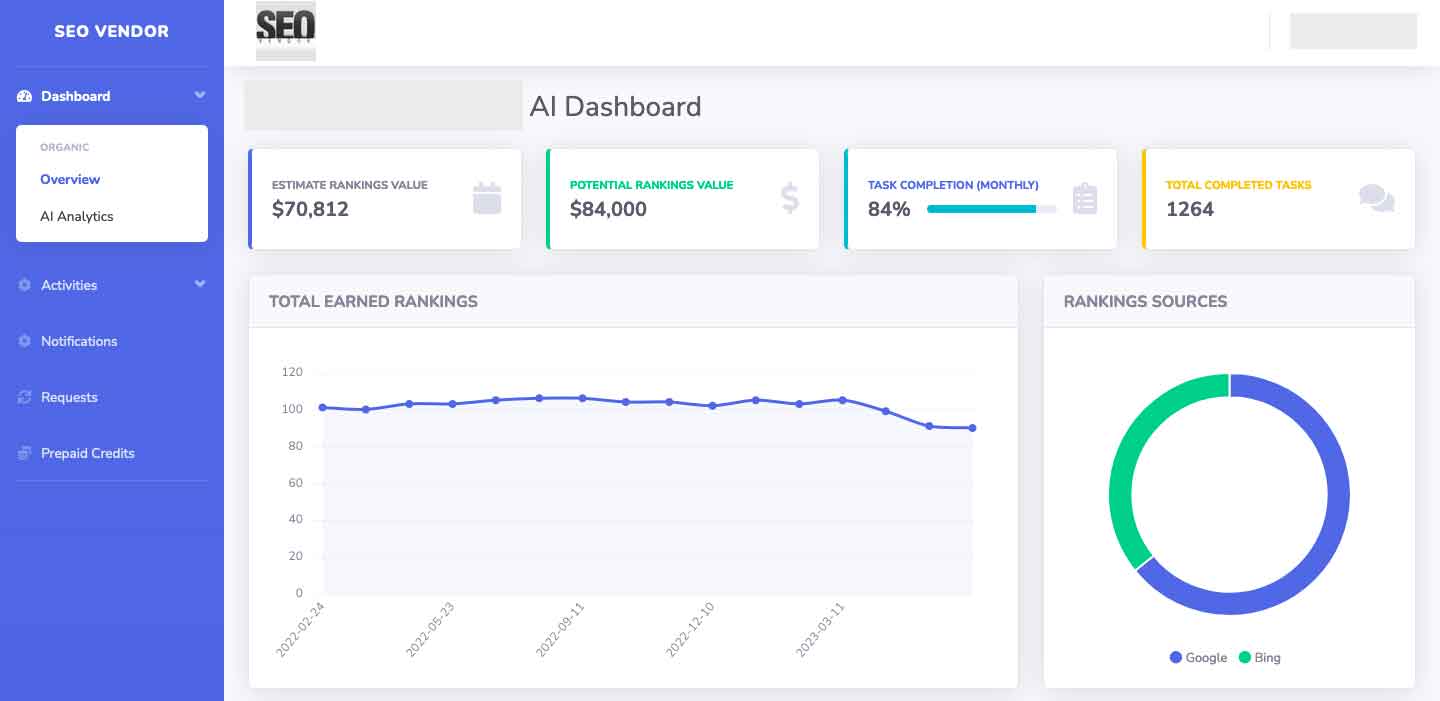White label SEO solutions are a great asset for agencies. They give them complete control to customize their own branded product. This can replace hours spent manually creating detailed reports, reducing tedious work and maximizing efficiency. By implementing white label SEO solutions, agencies can increase their profits in a competitive market and help themselves stand out from the competition.
Table of Contents
Furthermore, features such as automation will help save time so workers can focus on more important tasks like understanding trends or performing keyword research, ultimately leading to improved customer satisfaction levels too!
The Role of Automation in SEO Reporting
As your agency grows in prominence and clientele, consider the role of automation in streamlining SEO reporting. Automating these processes significantly improves efficiency by reducing manual labor requirements, allowing you more time to focus on other crucial aspects of your business strategy.
SEO white labeling further enhances this process by providing customized reports with your company branding while maintaining consistency across all client accounts.
Agencies no longer have to spend valuable resources creating detailed and personalized analytics for their clients from scratch each month or quarter. Automated white label SEO solutions are now available, allowing them to make use of sophisticated software. This software simplifies the compilation of data into user-friendly formats without compromising accuracy or thoroughness.
In essence, leveraging white labeling features and automation technologies is essential for transforming complex metrics into meaningful information. This benefits individual clients by giving them a deeper understanding of data related to their campaigns. It also provides a broader perspective on overall performance trends across the entire organization and industry fluctuations worth noting over time.
Challenges Faced by Agencies in Manual SEO Reporting
Manual SEO reporting presents various challenges for agencies aiming to provide top-notch services to their clients. One major hurdle is the time-consuming nature of collecting and organizing data from multiple sources without automation.
This often leads to less billable work being done, as employees are tied up with mundane tasks. Another issue in manual SEO reports involves maintaining accuracy when handling large sets of complex data. Mistakes can be easily made during compilation or presentation, potentially damaging an agency’s credibility and trustworthiness with its clientele.
Lastly, providing customized experiences becomes more difficult when creating each report by hand instead of utilizing white label SEO tools designed specifically for this purpose. As client expectations continue to rise, marketing agencies need to stay ahead technologically, otherwise, they risk disappointing customers who may then turn to competitors offering streamlined solutions.
Benefits of White Labeling in SEO Reporting Automation
White labeling in SEO reporting automation significantly elevates the professionalism and credibility of your agency. Incorporating personalized branding elements, such as logos, custom colors, and fonts, into automated reports create a consistent visual identity that clients can easily associate with your services. This level of customization fosters trust while showcasing attention to detail, factors essential for long-lasting client relationships.
Furthermore, white labeled automated SEO reports streamline workflow processes by generating insightful data from multiple platforms on-demand. Clients receive timely information presented cohesively under your brand’s umbrella, reinforcing dependability and expertise. Automation reduces administrative burdens associated with report creation, so agencies can allocate resources more effectively toward strategizing better campaigns or acquiring new clients.
Embracing white labeling SEO reporting allows agencies to showcase their unique branding alongside valuable insights within comprehensive performance analysis, thus fostering stronger connections with existing clientele while attracting potential leads through increased visibility and perceived competence.
Customization and Branding Opportunities for Agencies
Customization and branding opportunities for agencies play a crucial role in setting them apart from competitors while building trust with their clients. With SEO white labeling, reports can be tailored to reflect the agency’s brand identity by incorporating logos, color schemes, font styles, and personalized domain names.
This level of personalization enhances client communication as they receive consistent branding across all communications. Moreover, offering customizable solutions allows an agency to cater services according to individual client requirements without sacrificing reporting quality or performance standards. Clients feel more connected due to the unique touch added through customizations aligned with their preferences.
Leveraging customization options offered by white label SEO platforms is beneficial in several ways. Automated SEO report delivery becomes more efficient and streamlined. Furthermore, marketing teams at creative agencies can handle multiple accounts easily and efficiently with a distinctive brand image, which ultimately contributes to business growth goals.
Increased Efficiency and Time Savings Through Automation
By automating data collection, analysis, and report generation, you save valuable hours and reduce the likelihood of human error in interpreting complex marketing metrics. With more accurate reports generated faster using customizable templates designed to fit each client’s unique needs, agencies can make agile decisions for campaign optimization.
Furthermore, delegating repetitive tasks to automation tools allows marketers and analysts to focus on higher-level strategic planning and foster stronger relationships with clients through insightful discussions around their digital performance. Embracing such technology promotes consistent growth for your agency and its clientele by channeling resources effectively towards essential business objectives rather than tedious manual processes. Ultimately, utilizing white labeled SEO reporting automation paves the way for heightened overall productivity, delivering results that directly enhance profitability while leaving ample room for creative innovation.
Enhanced Client Communication and Trust with Branded Reports
Enhanced client communication and trust are strengthened through branded reports. Branding your SEO reports reinforces the value of your services to clients, instilling confidence in the work you deliver. A white-label solution for automated reporting lets you focus on personalizing content tailored to each client’s needs.
Customized messaging that demonstrates an understanding of their business goals helps strengthen the rapport between agency and client while delivering actionable insights through data-driven analysis. Transparent communication fosters trust as progress is continually displayed via clear visuals or easy-to-understand metrics. Providing valuable information paired with impressive branding contributes positively to the overall relationship with clients, who appreciate the attention to detail and a commitment to helping them succeed.
These are crucial assets in retaining long-term partnerships within competitive markets where customer satisfaction plays a significant role in growth strategies.
Implementing White Labeling for Automated SEO Reports
Implementing white labeling for automated SEO reports can immensely benefit agencies by allowing them to focus on core business functions while providing clients with valuable insights. To set up, first, select a reputable white label tool that meets your agency’s specific needs and analytics requirements.
Once chosen, integrate it seamlessly into your existing workflow; the best platforms offer easy-to-use features and support numerous integrations. Next, configure branding elements such as logos and color schemes within the platform so that all generated reports reflect your company identity. Establish a schedule for automatic report delivery, ensuring updated information is sent consistently to build client trust.
Lastly, secure access permissions based on user roles or project involvement to protect sensitive data while offering transparency when needed. By implementing this streamlined approach through white labeling solutions in the automation of reporting processes, you will enhance client communication efficiency, ultimately contributing positively towards overall satisfaction rates among your clientele base cultivated over time.
Choosing the Right White Labeling Platform or Tool
When selecting the ideal white-labeling platform or tool, consider your agency’s unique needs and goals. Begin by evaluating the specific features that will streamline automated SEO reporting for your clients.
Ensure compatibility with platforms like Google Analytics, Salesforce, and HubSpot; seamless integration saves time and resources. Analyze ease of use; a user-friendly interface makes report customization trouble-free, even for team members with less technical expertise. Assess branding options like logo placement and color schemes; they should reflect your agency’s identity effectively without compromising aesthetics or functionality.
Investigate customer support responsiveness if you encounter issues during setup/configuration stages or require ongoing maintenance assistance from the provider afterward. Finally, compare pricing plans among various tools while noting contract terms; this ensures an affordable solution that aligns well with budget constraints yet delivers optimal value across key performance indicators applicable to each client relationship.
Setting Up and Configuring SEO White Labeling Features
To set up and configure white labeling features, start by accessing your chosen platform. Look through its settings menu to find options related to branding or customization. Upload your company logo, select appropriate color schemes that match your brand identity, and adjust any additional preferences as needed.
Ensure you’re familiar with the tool’s various report templates to quickly generate tailored reports according to client needs. Experiment with drag-and-drop functionalities when customizing dashboards; this helps include essential data effectively while maintaining coherence in design. Once satisfied with the configurations and appearance of generated reports, save these settings as default if the software permits or create specific presets per client type.
Don’t forget to train team members on utilizing available resources efficiently. Proper knowledge sharing ensures consistent quality across all projects while maximizing time-saving benefits offered through automated SEO reporting solutions provided through white labeling functionality.
Integrating Automation Tools for Seamless SEO Reporting
Incorporating automation tools into your SEO reporting process can significantly streamline tasks and enhance efficiency. To ensure seamless integration, start by identifying reliable white label SEO platforms that offer comprehensive features tailored to your agency’s unique needs. Evaluate their compatibility with the systems you currently utilize; this will facilitate smooth data flow between different marketing channels within your organization.
Once you’ve chosen an ideal tool, customize it according to client requirements while maintaining brand consistency across all reports. Automated solutions reduce manual labor and help manage large volumes of data easily and accurately. Training team members to navigate these newly implemented systems is vital for successfully adopting and optimizing such technology within workflows.
Create guidelines outlining best practices when using automated reporting tools to ensure uniformity throughout the agency’s operations. By streamlining processes by integrating automation into SEO reporting, agencies can focus more resources on strategic planning instead of time-consuming administrative tasks, ultimately improving overall performance and fostering stronger client relationships.
Best Practices for Effective White Label SEO Reporting
SEO white labeling can significantly streamline your agency’s operations, allowing you to focus on fostering client relationships and expanding marketing efforts. To make the most of these services, it’s crucial to adopt best practices for effective white label SEO reporting.
Design Visually Appealing and Informative Reports
When designing visually appealing and informative reports for white label SEO reporting, focus on clarity and simplicity. Choose a clean layout that showcases the crucial data without overwhelming your audience. Utilize distinct colors to emphasize important metrics while maintaining consistency with your brand’s visual identity.
Incorporate charts or graphs to provide an easy-to-understand representation of complex information, ensuring their design aligns with users’ preferences and needs. Moreover, consider incorporating interactive elements within the report so clients can explore specific details more effectively; this not only further personalizes their experience but also aids in better understanding results-driven insights as they dive deeper into the analysis provided.
Incorporate Relevant Metrics and Key Performance Indicators (KPIs)
As you work on incorporating relevant metrics and key performance indicators (KPIs) into your white label SEO reporting, consider focusing on those that provide the most value to clients. Track organic traffic growth for a clear indication of SEO success. Keep an eye on keyword rankings, as they can reveal opportunities and areas needing improvement.
Monitor conversions from search engine results pages (SERPs) since it demonstrates the effectiveness of your content strategy. Lastly, analyze backlink profiles to ensure high-quality links are acquired while avoiding low-quality or spammy ones. These comprehensive KPIs will significantly enhance the overall usefulness of your white label SEO reports for all parties involved.
Ensuring Accuracy and Data Integrity in Automated Reports
To ensure accuracy, integrate white-label SEO tools with reputable data sources like Google Analytics. Consistently verify the accuracy of your platforms’ connections to avoid discrepancies or outdated information. Furthermore, establish firm protocols for monitoring data trends promptly to detect anomalies that could indicate inaccuracies within reports.
Investing time in validating your automated reporting system’s reliability will save frustration and bolster client confidence while presenting them with high-quality analytics essential for their business growth and success.
Overcoming Challenges and Limitations
To overcome the challenges and limitations of white label SEO reporting, establish strong communication with your provider to ensure alignment on goals and expectations. Request regular progress updates for more transparency in the optimization process. Additionally, ask for customizable reports that cater to your client’s needs while accurately reflecting relevant insights.
By fostering a collaborative partnership with the service provider, you can navigate potential issues effectively and achieve desired outcomes within specified timelines while maintaining overall control over project deliverables and client satisfaction levels.
Potential Drawbacks of White Labeling and Automated SEO Reporting
Despite the benefits, one must consider the potential drawbacks of white labeling and automated SEO reporting. Miscommunication can lead to discrepancies in expectations between reseller services and clients. Additionally, reliance on automation could result in overlooking key insights as manual analysis is lessened.
Data interpretation may suffer from inaccuracies due to generic templating or limited customization options, hindering effective communication with the client about their website’s progress. It’s crucial for businesses providing and receiving these services to carefully assess potential issues while maintaining open lines of communication throughout the process.
Addressing Client Concerns and Maintaining Transparency
To address client concerns and maintain transparency in white label SEO reporting, establish open communication channels for discussing progress. Explain clearly the strategies employed and how they benefit the clients’ goals. Offer regular updates on their campaigns, giving them insights into ongoing efforts without revealing your proprietary techniques.
Tailor reports focusing on meaningful metrics that directly impact business objectives while being easy to comprehend by non-experts. By striking this balance between disclosing essential information and protecting trade secrets, you instill trust in clients while safeguarding your agency’s competitive edge.
Continuous Monitoring and Improvement of SEO Reporting Processes
Elevate your white label SEO reporting by consistently monitoring and refining the processes involved. Regular assessments enable you to identify weak areas, streamline workflows, and implement improvements for utmost efficiency. Consequently, such practices lead to enhanced client satisfaction as they receive accurate insights tailored to their needs consistently.
Engage in industry updates and innovations to grow your reporting process perpetually. This proactive approach yields long-term benefits as clients appreciate transparent communication backed with up-to-date knowledge that effectively boosts their business strategies.
SEO White labeling is a great way for agencies to save time on their SEO reporting. With white label services, such as those offered by SEO Vendor, you can customize your report URL and quickly generate reports in just a few clicks. This gives clients the confidence that they’re getting accurate results without needing many resources from their agency’s staff or third-party vendors, which helps increase efficiency and profitability.
Furthermore, secure encryption protocols are used in these software packages. This ensures that only authorized users can access the data provided through these reports. This helps to maintain the confidentiality of all relevant information that pertains to clients’ business operations. Additionally, this makes it possible for any digital marketing agency to complete each project accurately and in a timely manner while better serving its customers efficiently!










